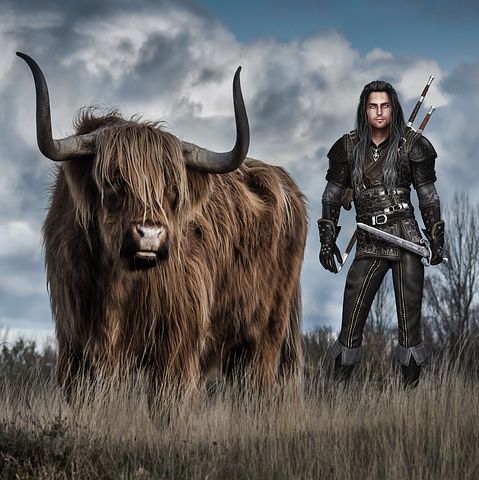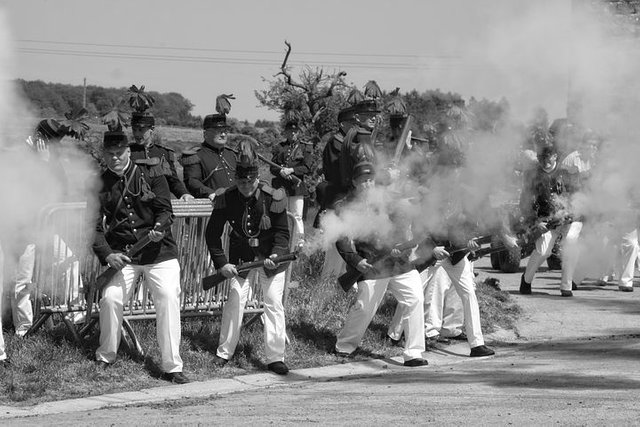How the Family of Okoro Rose to Greatness --- Contributed by @scarletmedia

Image source
At night, when the moon is full or the fire in the porch is red, children from four to eleven years of age glad with the evening meal gather round to play games, to dance or to tell folk stories. A great man to them is one who can tell wonderful and exciting tales. Animal stories are among the most welcome, but sometimes their inquisitive minds long for something of a different nature, especially when there is an old man in their midst. The old often sit among children, for in a sense they have returned to childhood. The children's questions are usually sensible, though sometimes childish, and they always expect satisfactory answers.
Who were the first people to inhabit our land?
Why is Atago our chief?
What has made this or that family famous?
Such are some of the questions they ask and when they think a thrilling answer is coming, they draw up close so as to hear every word that is spoken.
One of my favourite stories was an answer to the last question: what has made the Okoro family (eze) so famous? Almost every child in my area can tell the story about this family and how its fame began, as well as being able to sing the songs that go with it.
In the very olden days, when men and animals were considered equal and lived together in the same community, a dispute suddenly arose as to who should be supreme. The animals, with the hare as their mouthpiece, maintained that they were wiser and could make decisions that would best suit everyone. But in the end, after a series of arguments, the animals were silenced and men became the leaders of the village.
Tortoise, however, felt deeply this loss of power and decided to hit back. Famous as a soothsayer, he knew that whatever he said was bound to happen, and in a short time he appeared in the village, big with his mission.
“There will be a great war between this village and the next,” he announced. “For two whole years you shall taste no rest nor rest with your wives and children”.
Silence, sadness and fear prevailed as these words were uttered. Nor would tortoise modify, alter or withdraw them. He was promised every possible form of wealth, power and greatness if he would say his prophesy had been mistaken; but in vain. Everyone had to sharpen his tools, arrows, machetes, spears and other implements of war.
The cause of this war tortoise had predicted was an old quarrel over a piece of land in the boundary between the two villages. Soon after the prophesy, things came to a head. Since there were no courts in those days to resolve such conflicts, war was always the deciding factor, for the victors naturally won the case and became masters of those they defeated.
The day of reckoning was declared and both villages prepared for battle. Every male took a bow and arrows, a machete, a club and a sling. They spent many hours perfecting the use of these weapons and those who were not so good were given different tasks to perform.
Deep in the forest, huts were built where the women and children will hide. There was still one more day of preparation, yet no one felt at all confident. An appeal for help was made to Tortoise, but he remained uncompromising.

Image source
Battle was joined the following morning with great vigour on both sides. Late in the afternoon, victory was still in the balance, though many had fallen from both villages. Then, towards evening, the village doomed by tortoise was obliged to surrender, having lost most of its chiefs, all its finest warriors – and finally its leader himself. They had lost the battle, and with it the great expanse of land for which they had fought.
Sorrowful and ashamed, the survivors quietly returned to their homes, mourning the loss of their loved ones. The found it very difficult, however, to accept their humiliation with good grace and made up their minds to seek revenge by every possible means.
They approached an old man famous for his skill in witchcraft. He demanded two fouls, two goats and two women. With these and certain herbs from the forest, he prepared a portion which was to vanquish their enemies.
For three nights, accompanied by some experienced assistants, he visited each compound in the enemy village, sprinkling the portion as he went. At first nothing happened. Then, on the third day, people started to die in large numbers. On the fourth day, more than half the inhabitants had died and most of the living were very ill.
A man from that village called Okoro decided that the only way to save his family was to flee from it before the plague could strike them. In the dead of the night, Okoro, his wife and their two children made their way to a distant township and there found shelter in the shrine of its god. No importance was attached to their escape and the following day, with every other enemy dead, the successful villagers marched happily back to claim the land they lost.
They were not to enjoy its fruit for very long....Two years after the battle Okoro, now forgotten by everyone, returned to the surviving village as a native doctor, accompanied by a viper, an antelope and a tiger. These, he said, had the power to do anything the people desired. They could cure diseases, tell the future, make one rich, vanquish all enemies – and do every other thing they were asked to do without charging anything. All they demanded from the people was obedience to their least command.
Nobody wanted to miss such a golden opportunity. From every corner of the village, men, women, even children, flocked to Okoro and his companions, each with his own request. All who came were divided into three groups and told which creature they should meet.
Attentively they listened. Each person wished to carry out every command and feared to make a mistake. But did those who wanted wealth become rich? Were those who were sick cured? Did any of them achieve their wishes? Not one of those who went to that strange gathering ever came back. Nobody died, but each person was turned into whichever animal he met and wandered away into the forest.
Thus Okoro became sole heir to the two villages and to the land that caused so many sorrows.
Whenever old men come to the end of this story, they also warn their little ones to beware of struggling for some power which may bring them evil instead of good. It is better, they will say, to be ruled and be happy than to rule in fear and insecurity.
The End
Blog contributor: @scarletmedia
@stach.pay is a community innovative account created to promote and provide rewards for the creative commons seeking to get rewarded for their works on the Steem Blockchain. If you like this article, please do well to follow the writer above.
Thank you for reading
Thank you for reading
It's a good one.
Thank you
good story!!
Thanks!
Okoro people. so scarlet, you might wanna consider writing an entry for Sankofa. check it out here...
https://steemit.com/sankofa/@sankofa/lies-my-granny-me-storytelling-task-some-prizes-inside
Lol. I'll be sure to check it out. Thank you! 😄
Many thanks to @stach and @stach.pay for this great opportunity. I am indeed encouraged to be better at what I do.
Thanks again!
Nice , thanks for sharing. Cheers
Please Stop - @facttechz
You just said "thanks for sharing" and in your your last 100 comments you used 30 phrases considered to be spam and you made this exact same comment 1 times. You've received 3 flags and you may see more on comments like these. These comments are the reason why your Steem Sincerity API classification scores are Spam: 77.70% and Bot: 3.90%
Please stop making comments like this and read the ways to avoid @pleasestop and earn the support of the community.
Nice one dear, very creative
Thank you @atikajayboy